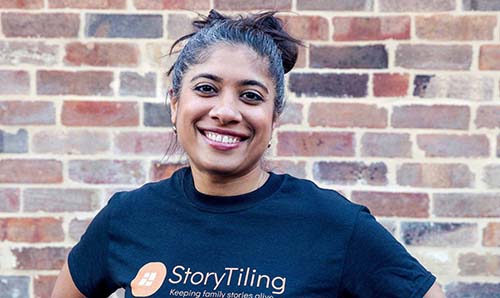Dr Aliaa Remtilla

Social Anthropology MA (2007) and Social Anthropology with Visual Media PhD (2012)
Aliaa is the Co-Founder and Chief Scientist a Story Tilling. She talks about what she does now and how she got there.
My current role and how I got there
Today, I’m the co-founder of a VC-backed startup. StoryTiling uses social sciences and technology to offer companies a novel approach to employee on boarding and engagement with automated and personalized videos. Our platform is designed to address the critical gap in early retention and productivity by making employees feel immediately valued and part of the team.
If you told me years ago, that this is what I’d be doing, I'd have laughed. It seems a world away from my days diving into Visual and Environmental Studies at Harvard and then into Social Anthropology for my MA and PhD at the University of Manchester. And yet, the key thing that makes our startup stand out—our unique value proposition—is rooted in my blend of filmmaking and anthropological expertise.
After my studies at University of Manchester, I didn't jump straight into startup life. I was out there in the field, doing commissioned research for the London-based Institute of Ismaili Studies, while simultaneously getting my hands dirty in the non-profit sector as an Executive Officer.
One of my research projects (a detailed history of the East African Ismaili Muslim community and their space of worship, the Jamatkhana) actually just culminated in a book, published this year, aimed at making these insights accessible to non-academics. And the non-profit work had me all over the map, from the United States to Australia, New Zealand, and Papua New Guinea, tackling everything from strategic planning to youth development.
It might seem like a leap from academia and non-profits to a tech entrepreneur, but it's all connected. My journey has been about understanding people, their stories, and how to bring them together. I love being able to do this work in a myriad of ways.
If I’m being really honest with myself, my course bought me time to figure out what I really wanted to do…while:
- Teaching me extremely valuable skills that I continue to rely on;
- Creating space for the type of self-discovery and personal growth that’s only really possible when you’re studying (and that I really needed to mature into the adult I am today); and
- Giving me the ‘social capital’ of having the degrees.
Did you always know you wanted to do the career you’re in?
Honestly, no, I didn't have it all figured out from the start. It's been more like putting together a puzzle without having the picture on the box.
Each piece of my journey, from my time at the University of Manchester to working across different countries, taught me something crucial.
My time at Manchester taught me how to analyse human behaviour and social structures. And it showed me how to ask questions that go beyond the obvious, to unearth deeper truths. And I became an expert at getting people to open up and tell me their personal stories. These skills are our ‘secret sauce’ to building our tech startup.
And…this might sound trivial…but getting the 'Dr.' in front of my name helped me a lot outside of academia! You'd be surprised how much weight that carries, from getting your foot in the door with potential leads to convincing investors you've got what it takes.
My experience at Manchester
I originally chose University of Manchester as it’s the best place in Europe/UK to combine anthropology with film production! I consulted my professors at Harvard, and they all agreed there was no better place for this in the region.
I wasn’t interested in going to University in North America…even though I’m from Canada and did my first degree in the States…because I’d used up my NCAA eligibility to play field hockey. At University of Manchester, I was able to play Premier level field hockey throughout my studies, even as a graduate student!
My PhD taught me how to write. Clearly. Simply. This was surprising to me since academic writing is typically obtuse. Learning how to write precisely what I want to communicate (nothing more, nothing less…and nothing confusing) has been one of the most useful skills I’ve taken into the ‘real world’.
One thing that was central to my experience was the environment of the department. I felt like I was able to knock on the door of any professor to ask a question or have a chat. We had a close-knit cohort of PhD students. And our social calendar was filled with nerdy events and evenings at the pub … continuing to nerd out, just at a different location. I never felt alone, no matter how hard it got (at times) to get that PhD written and submitted.
My advice for future students
For MA students: Do the reading. All of it. And more. This is where all the learning lies. I wish I’d taken more advantage of this time to really invest in self-directed learning, beyond the minimum requirements. You’ll never have this much time to read again.
For PhD students: Your supervisor is the most important part of your journey. Mine (Dr. Soumhya Venkatesan) was amazing – she shaped my experience, taught me every skill I gained, and provided the emotional support I needed to succeed. I had the advantage of getting to know her while doing my MA, and this gave me confidence that she was the best person to guide me on my PhD journey.
Find a way to ensure that your personality/academic fit with your supervisor is amazing BEFORE starting the program.
